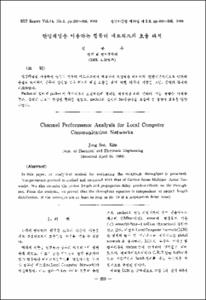Dual Decision Feedback Equalizer를 위한 LMS 알고리즘과 변형된 Steepest Descent 알고리즘이 결합된 새로운 적응 등화 알고리즘
- Alternative Title
- New Adaptive Equalization Alogorithm by Using Combined LMS/Modified Steepest Descent Algorithm for Dual Decision Feedback Equalizer
- Abstract
- Decision Feedback Equalizer(DFE)는 심한 심볼간 간섭이 존재하는 채널을 보상하는데 있어서 선형 등화기 보다 잡음 성분의 증폭이 적으므로 현재도 통신 시스템 및 하드 디스크 드라이브와 같은 자기 기록 장치의 채널 등화에 사용된다. 또한 최근에 동일한 구조의 DFE 두 개를 병렬로 사용하고 적은 메모리를 사용하여 성능을 향상시킨 Dual Decision Feedback Equalizer(DDFE)가 제안되었다. DDFE는 shift register를 사용하여 등화성능을 향상시킨 반면 시간 지연으로 인하여 Least Mean Square(LMS) 알고리즘과 같은 적응 등화 알고리즘을 적용하는데 어려움이 있다. 따라서 본 논문에서는 일반적으로 시불변 채널을 보상하는데 사용되는 DDFE가 시변 채널에 있어서도 효과적인 등화를 할 수 있도록 DDFE에 알맞은 등화 기법을 제안하였다. 컴퓨터 시뮬레이션을 통하여 본 논문에서 제안한 적응 등화 알?磁?즘이 LMS 알고리즘을 적용한 DFE와 대등한 성능을 가짐을 확인하였다.
The Decision Feedback Equalizer(DFE) is one of currently used equalizers in communication and magnetic recording systems such as hard-disk drive since it can compensate for channels with severe inter-symbol interference(ISI) without as much noise enhancement as the linear equalizer(LE). To improve the performance of DFE, Dual Decision Feedback Equalizer(DDFE), which is constructed by using parallel combination of two DFEs and its performance is superior to the DFE, was suggested. However, DDFE is a preset equalizer which is used in a known channel. It is very difficult to make DDFE system applicable to unknown channel environment occurred in wireless communications. Because DDFE has shift registers which cause time delay. To make DDFE system applicable to unknown channel environments, we suggest proper adaptive equalization technique for the DDFE in this paper. Through computer simulation, we show that the proposed adaptive equalization technique for the DDFE is comparable to the performance of conventional LMS algorithm for DFE which doesn't have time delay.
The Decision Feedback Equalizer(DFE) is one of currently used equalizers in communication and magnetic recording systems such as hard-disk drive since it can compensate for channels with severe inter-symbol interference(ISI) without as much noise enhancement as the linear equalizer(LE). To improve the performance of DFE, Dual Decision Feedback Equalizer(DDFE), which is constructed by using parallel combination of two DFEs and its performance is superior to the DFE, was suggested. However, DDFE is a preset equalizer which is used in a known channel. It is very difficult to make DDFE system applicable to unknown channel environment occurred in wireless communications. Because DDFE has shift registers which cause time delay. To make DDFE system applicable to unknown channel environments, we suggest proper adaptive equalization technique for the DDFE in this paper. Through computer simulation, we show that the proposed adaptive equalization technique for the DDFE is comparable to the performance of conventional LMS algorithm for DFE which doesn't have time delay.
- Issued Date
- 2001
- Type
- Research Laboratory
- Alternative Author(s)
- Kong, Hyung-Yun; See, Sung-Ho
- Publisher
- 공학연구논문집
- Language
- kor
- Rights
- 울산대학교 저작물은 저작권에 의해 보호받습니다.
- Citation Volume
- 32
- Citation Number
- 1
- Citation Start Page
- 163
- Citation End Page
- 174
- Appears in Collections:
- Research Laboratory > Engineering Research
- 파일 목록
-
-
Download
 000002024043.pdf
기타 데이터 / 232.11 kB / Adobe PDF
000002024043.pdf
기타 데이터 / 232.11 kB / Adobe PDF
-
Items in Repository are protected by copyright, with all rights reserved, unless otherwise indicated.